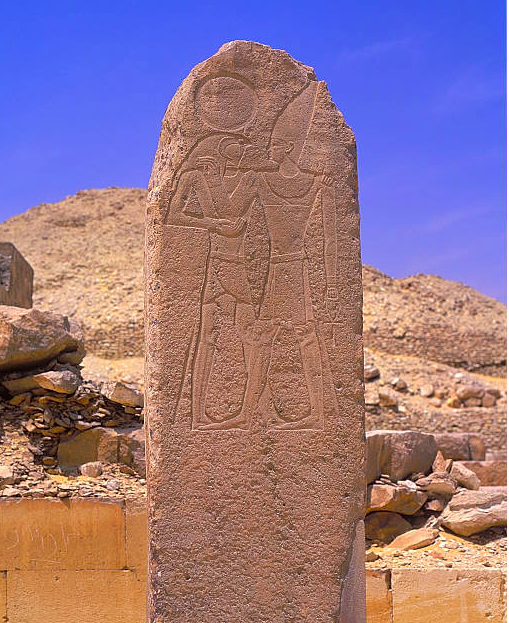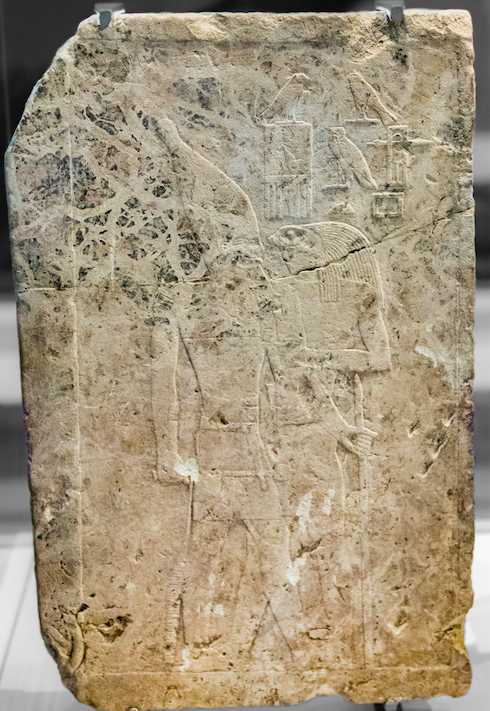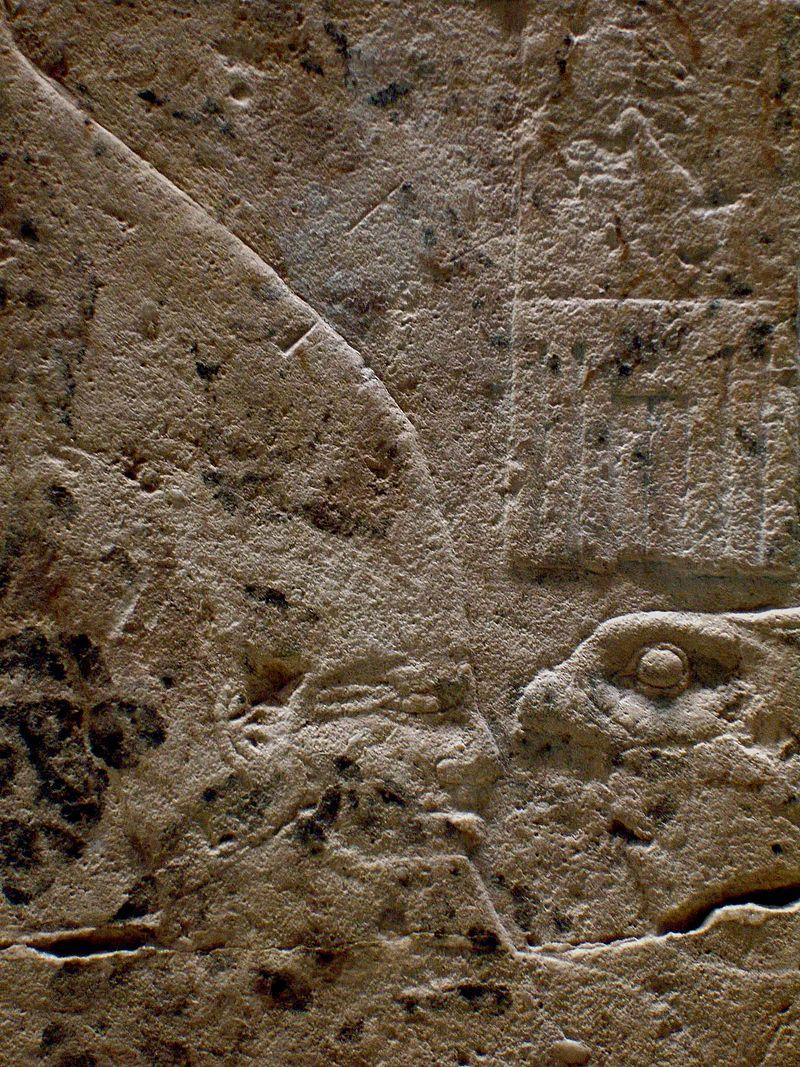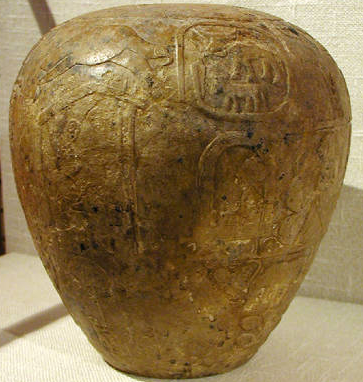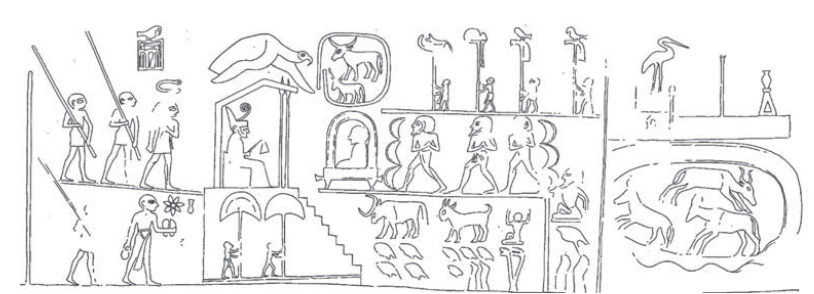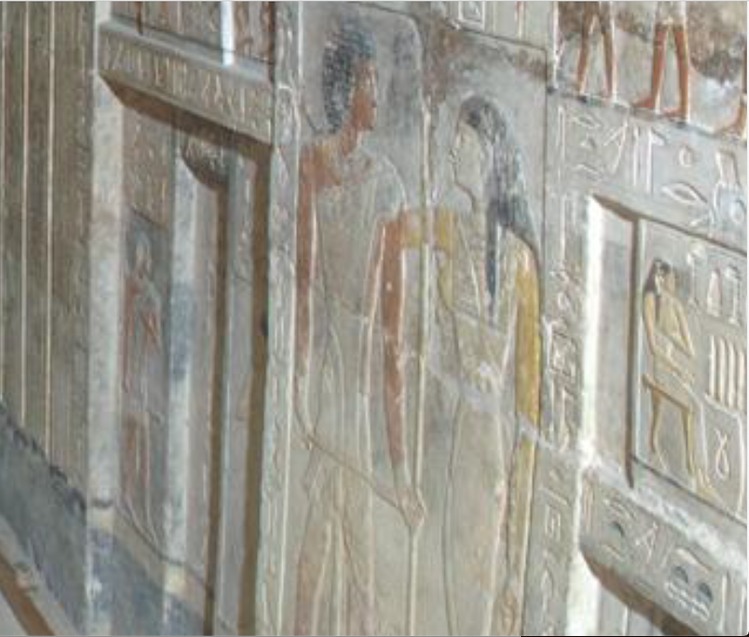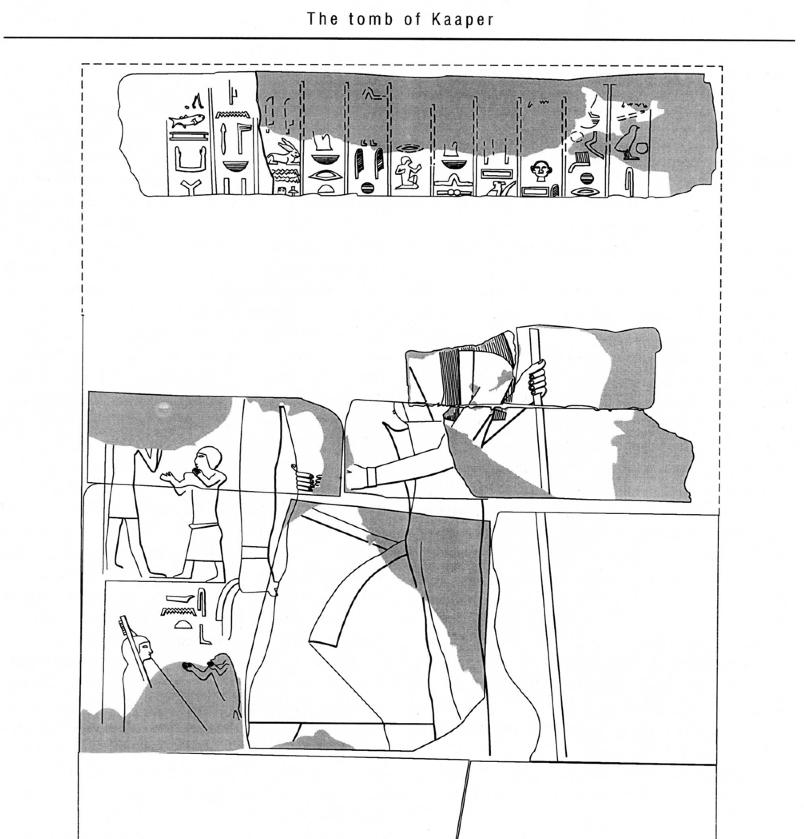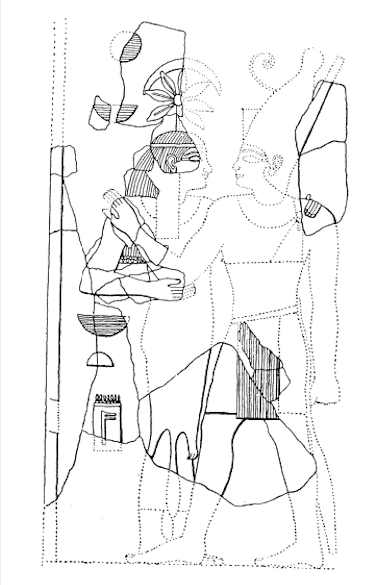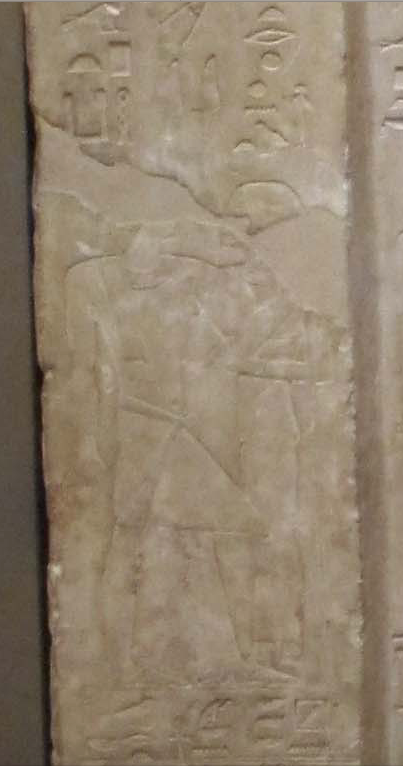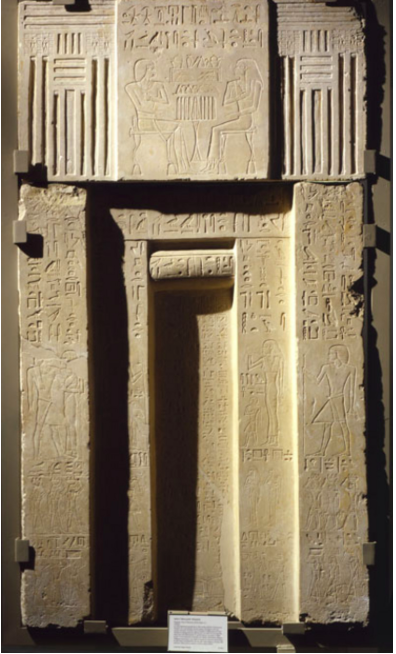The mother and the young girl
New interpretation about the mother and the young girl.
Statue (en greywacke, 84,5 cm de Ht.) of a triad, composed of the goddess Hathor représented like a mother embracing his son the pharaoh Menkaourê (IVth dynasty), smaller in size, but whose body is the adult's one, wearing a crown of Upper Egypt, and holding the mace Hedj.
A young girl personifying the nome of the hare (Hermopolis Magna) in Upper Egypt appears as Hathor's daughter (Museum of Fine Art de Boston).
This triad has been founded with three authers (in Cairo), representing Hathor this time as pharaoh's wife, and a child personifying a nome, who is designated, in all the triads, by three expressions, according to the words of Hathor to the pharaoh : « I have given you all perfections (nfrt nbt), all offerings (?tpwt nbt), all provisions (?f?w nbt) in Upper Egypt forever ». And the function of offering belonged to the wife (cf. forthcoming paper). The nome personnifyed was then conjugally linked to pharaon, like Hathor.
Those triads come from the low temple of the pharaoh's pyramid at Giza. They were brought to light in 1908 by G. A. Reisner.
About the triad in Boston, Hathor is « the great young girl » et la « mother »/cow « not human » of pharaoh, because she « suckle N, and she will not wean him » (infra). Indeed Hathor symbolised « Pé and Nekhen », the « two chapels of South and North, jtrty »/stars/gods, all the nomes/men divinised, united with the child pharaoh by an unswerving fidelity, properly spousal (forthcoming paper) :
cf. TP 412 (T/SP/N 1 P/F/Sw A 27 N/F/Nw ii 35 Nta/F/Sw 19 Ntb/F/Se ii 59)
<§725d> Pé naviguate amount to you (?sf n=k P),
Nekhen sails down to you (?d n=k N?n),
The mourners call you (?sw n=k smntt),
The priests imy-?nt (J.P. Allen : those who are ahead) are dressed (Allen : cloth the kilt) for you (sw? n=k jmy-?nt.w),
There is a welcome for you, O N, because of your father (jy m ?tp jr=k N n jt=k),
There is a welcome for you because of Rê (jy m ?tp jr=k n R?).
(...)
§728a: « The great young girl (?wnt wrt) who lives in Héliopolis, has placed for you her hands on you, because there is no mother among men who would wear you, because there is no father among men who could beget you.
<§729> Your mother is the great wild cow who live in Nekheb, with a white cap, with long feather, with pendulous breasts, she suckle you and she will not wean you (snq=s ?w, n w??=s ?w)
(...)
You appear with a royal garment (j??=k N, m ?t??t), your hand are taking the scepter (jm? ?rt=k ?ms), your fist is holding the mace (?f? ?f?=k ?r ??).
(...)
Stand at the head of the two chapels(??? N m ?ntj jtrty), judge gods (w?? mdw n?rw),
because you belongs to stars, wich surround Rê, wich are in front of the star ‘morning's god’ (n-?w n??w p?rw R? tpw ?wy dw?-n?r) ».
The mother cow Hathor/earth/country/Horus and Seth (=North and South of Egypt), was indeed also the wife of the pharaon symbolised by inundation :
TP 271 (W/A/S 40 T/A/S 8 P/V/E 16 N/A/W 60)
« N has submerged the country gone out of the lake (W pj m?j t? pr p š),
N has ripped (?) the papyrus plant (w. pj zšš w??),
N has satisfied the two lands (w. pj ?tp t?wy),
N has united himself with the two lands (W. pj zm? t?wy),
N has united himself with his mother, the great cow (W. pj dm? mwt=f sm?t-wrt).
O mother of N, the cow wife (mwt nt W., sm?t ?mt)
who is on the mountain of pasture (=Horus) (tpt ?w smj)
who is on the mountain of the bird z?z? (=Seth) (tpt ?w z?z?),
The two pillars djed are up (???y ?dwy), the rubbles fell (h?y ??t),
and N goes out on this ladder which his father Rê has donne for him (pry W. ?r m?q?t tn jrt~n n=f jt=f R?).
Horus et Seth have seized his hands, they have taken him (šd) to the ‘Dat’ ».
This mother appears again with her daughter in the ritual called Confirmation of Royal Power : a swallow symbolising Isis (=the banks, the egyptiens) announces and greats Râ at sunrise with a prayer. She evokes her mother/country, who is also the mother of pharaoh/Râ. Both mother and daughter are « offerings », i.e. wife of pharaoh (cf. forthcoming paper): :
« <XX, 19> Bring a living swallow to the king. Anoint his head with ointment-m? (wr? tp=s (m) m?), set her face to him (the pharaoh).
Formula to say : so, the swallow unveiled her face when she spoke to Râ (=the pharaoh) (kf?w rf mn.t ?r=s, mdw=s n R?).
She had found Râ standing coming to her (gm.n=s R? ???(=w) m ?ss=s), the cupbearer having given him fresh water and bread-šdwt (wb? dd n=f mw šd.wt).
<XX, 20> ‘(O) Luminaire of sky, luminaire of land (??w n p.t, ??w n t?)
You who rise in the wind (wbn=k m m??),
You who open the ways (sš=k sššy.w)
You who shine on the breast of Ptah (psd=k ?r šnb.t n.t Pt?),
If you give me the way (mj rdj=k n=j w?.t),
I will find the ways out with the children of my mother (gm=j pr.w ?n? msyw mw.t=j) ’.
<XX, 21> Formula to say – what the swallow has said :
“ O this one who rises (to the sky) (j wbn)
O this one who shines, this one whose hair braid is in gold ( Ddw j psd, Ddw p? nty ?nks=f m nbw),
This one who sails in the Nwn (?dw ?nty m nwn)!
You who are provided of your offerings (dét. du pain d’offrande) (w?.t m ?tp.w=k)
Your egg is broken next to you (sd sw?.t=k r-gs=k)
(and) I am a child with (you) (jnk [msy m-?](=k)) »
In the Love's Songs (New Kingdom), it is also discussed of almost only about the mother and her daughter, « the sister », because they represents both, Egypt (the gods/divinised men). Alone the « sister » is united to her « brother » (=Osiris Rê, cf. autres pages) for the purposes of the transposition de mythology, into a song of standart conjugal love :
« (she) He (the brother) is a neighbor of my mother's home la maison de ma mère, (sw m s??-t? n pr n t?y=j mwt),
I would not go to him (nn r?=j šm.t n=f).
My mother would be right in ordering me so : leave this idea (lit : of seing this) ! (nfr mwt m ?nw=j m nf j.??? m?? s.t) ; (…)
The brother doesn't know my desire of embracing him, (bw r?=f n?y=j ?b=y Hp.t=f),
my desire is that he send a message to my mother (mtw=f h?b n t?y=j mw.t) » (P. Chester Beatty c 1,9-2,3).
« (She) Ah ! if my mother knew my heart and that the idea comme to her now (she whoud accept it instantly) ; Goddess of gold, yes, put this in her heart and I will precipitate to the brother. I will kiss him before his family and I will not cry in front of his people. I will be delighted that they anderstand that he knows » . P. BM 10681(=Chester Beatty I v°section C, 4, 3).
« (She) Your love retains me, and I cannot untie me from it.
I will take back my nettings but what to say to my mother, to whom I go as many as there are days, loaden of birds ?
I haven't set a trap today, because your love has taken me » (P. Harris 500 (4,8)).
Laure de Lamotte ©
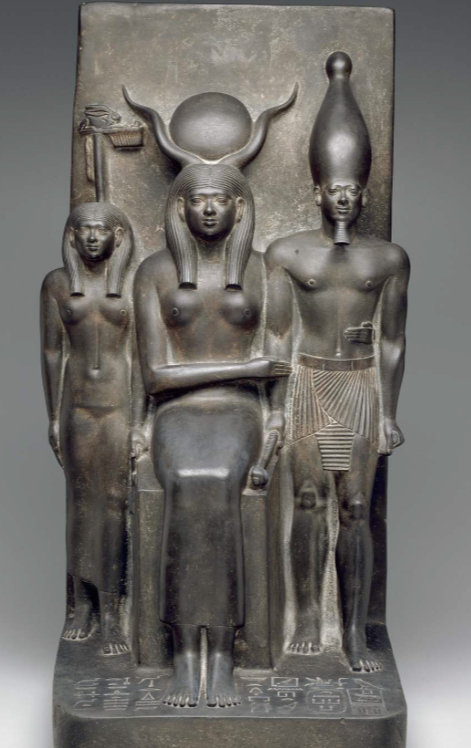
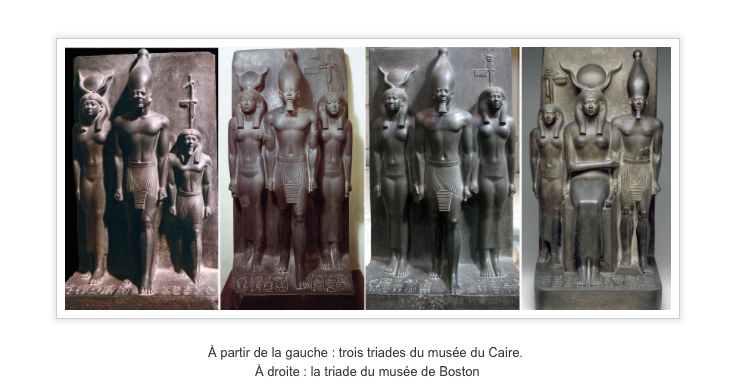
Last edited: 24/05/2021
Add a comment



